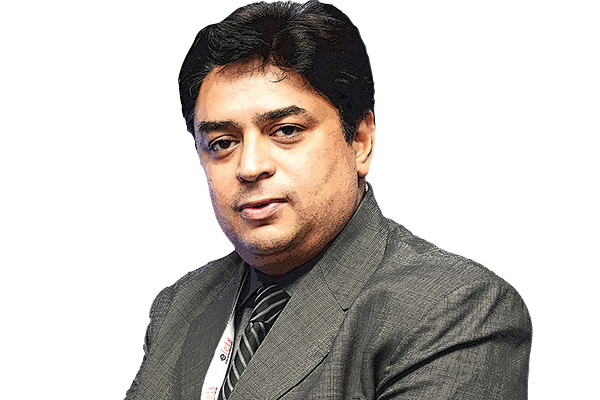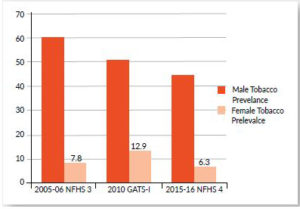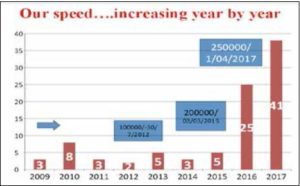

Secretary, Department of Medical, Health & Family Welfare, and
Mission Director of National Health Mission, Government of Rajasthan
Daughters are precious and the Rajasthan Government has left no stone unturned for the cause of girl child. Naveen Jain, Secretary, Department of Medical, Health & Family Welfare, and Mission Director of National Health Mission, Government of Rajasthan, shares his views on various initiatives taken up under the Pre-Conception and Pre-natal Diagnostic Techniques (PC & PNDT) Act in the State in conversation with Kartik Sharma and Rajbala of Elets News Network (ENN).
Why Pre-Conception and Prenatal Diagnostic Techniques (PC & PNDT) Act is important in the context of Rajasthan?

The PC & PNDT Act was implemented in 1994 and its rules were framed in 1996, and gradually some amendments were made in early 2003 and 2004. But the implementation of the Act had always been questionable.
Rajasthan is infamous for female foeticide. Our child sex ratio, which is computed for 0 to 6 years of age group, has been falling continuously since 1981. It was 954 in 1981 which fell down to 888 in 2011 census. The implementation of PC & PNDT Act is very important for Rajasthan because of the suspicion that many registered centres are engaged in illegal activities, or some unregistered people with unregistered machines are also involved in this sex determination business.
Therefore, implementation has become more important so that by 2021 we can have a respectable child sex ratio. Falling child sex ratio or lower sex ratio will have many social implications which could later result in social imbalance. Hence, taking a serious view of the onslaught of sex-selective discriminatory practices which could have social as well as other impacts, it is very important to implement the Act in its letter and spirit.

Which initiatives Rajasthan has undertaken in recent years to implement PC & PNDT Act?
The Rajasthan Government has taken many initiatives under the National Health Mission and has its own PCPNDT cell to implement the Act. The PCPNDT cell of Rajasthan has been most active in the last few years and many strict measures have been taken by it. The Honorable High Court of Rajasthan has issued many directions on which the State Government has been working very hard.
As a result, the implementation of PCPNDT Act has improved considerably over these years. Firstly, all sonographic machines have been connected to an active tracker which is a mechanism to look into the activities undertaken at the registered centres.
It acts as a deterrent against the misuse of sonographic machine. Now, GPS machines are also installed on sonographic machines in Rajasthan after 2015. In this way, directions of High Court as well as many decisions by the Government and strict enforcement by the PCPNDT cell have improved the overall sex ratio at birth which will finally lead to a better child sex ratio in 2021.
What are the specific initiatives undertaken by Rajasthan to stop sex determination as well as sex selective abortion?
Active trackers have been installed on all the sonographic machines and from 2015 it has become mandatory to install GPS also on all sonographic machines which are capable of sex determination.
Secondly, a very strict monitoring is done over these machines to keep active trackers working efficiently. Thirdly, the PC & PNDT Bureau of Investigation has been constituted by the Rajasthan Government and now, this government has equipped this bureau with competent persons.
The bureau is headed by the Secretary Medical and Health for Rajasthan, while an Additional SP and many officers from the circle inspector and SHO cadre have been provided on deputation by the Police Department.
Moreover, this bureau has been made capable by adding Additional Director Prosecution and medical experts. It has done many operations successfully.
In addition to that, the informer scheme has been made more attractive by announcing a reward of Rs 2.5 lakh for a successful decoy operation. The informer is given Rs 1 lakh and the pregnant women, who acts as the decoy, is also given a reward of Rs 1 lakh. If any person assists in the operation he or she is given a reward of Rs 50,000.
In this way, the informer scheme has become very successful. Many information against illegal sex determination are coming to the bureau and based on that decoy operations are conducted. In all these years, the judiciary has been very much helpful and as a result people who have been caught red handed are kept in jail for longer period. Constant follow-ups during the trial has improved conviction rate as well.
All these initiatives jointly have helped create a better environment for the birth of girl child in the State.
Do you think enforcement is enough for implementing PC & PNDT?
No, we think that enforcement is the starting point. You have to enforce the Act of the land for sending out a clear message. But this is also true that enforcement alone is not enough because female foeticide is a social problem. We have to change the mindset of the society to encourage the birth of girl child.
Last year, our PC & PNDT cell in Rajasthan started an awareness programme known as Betiyan Anmol Hain or daughters are precious, during the 2nd Annual Healthcare Summit Rajasthan organised in association with Elets Technomedia.
Enforcement and awareness are going hand in hand, and as a result we are getting tremendous response from the society. The enforcement alone cannot break the demand from the society to prefer only male children, as also awareness alone will not motivate people to have female children. Therefore both awareness and enforcement have to go hand in hand.
The informer scheme has become very successful. Many information against illegal sex determination are coming to the bureau and based on that decoy operations are conducted. In all these years, the judiciary has been very much helpful and as a result people who have been caught red handed are kept in jail for longer period. Constant follow-ups during the trial has improved conviction rate as well.
What steps Rajasthan has taken for the control of tobacco use?
Every third adult person in Rajasthan State is using tobacco in one form or the other. The varied indigenous range of tobacco products locally available is adding more complexity to the tobacco control issue. But due to strict tobacco control measures and awareness drive taken up at the State, district and subdistrict level use of tobacco among adult population in Rajasthan State is declining constantly.
[su_box title=”Declining trend of Tobacco Use Prence in Rajasthan State” style=”soft” box_color=”#ffffff” title_color=”#c41d0b” radius=”0″]

The Government of Rajasthan is working on National Tobacco Control Programme (NTCP), which is currently being implemented in all 34 districts of the State. A state-level coordination committee has been constituted in order to ensure that coordinated efforts are made by all key departments including home, medical and health, finance, agriculture, rural development, Panchayati Raj, law, education, forest and environment. All our districts have the mechanism of reviewing the progress of tobacco control under the District Collector quarterly. Various campaigns have been initiated which aim at deterring the demand, creating awareness and assisting to quit.
We have started developing all our Anganwari Centres into tobacco free area. Sale of tobacco products within 100 wards of these institutions is prohibited. Also, all healthcare and educational institutions in Rajasthan State are being made into tobacco free areas. Elaborate guidelines and a reporting mechanism have been established to ensure effective compliance.
Due to these rigorous efforts tobacco control is now taking priority within the ambit of public health. Rajasthan is the first State in the country that has made it mandatory for tobacco sellers to restrain from displaying tobacco products at the point of sale. Another drive includes enforcement of key provisions of Cigarette and other Tobacco Product Act, 2003; Rajasthan State has set up enforcement mechanism in all Districts up to Block level, total 2.39 lac challan were done.
 Tobacco cessation centres are made operational in 16 districts in which 12,282 tobacco users were counselled during 2016-17. Besides this, toll free Quitline (PAHAL) was made operational through 104 (medical advice service) and 108 (emergency helpline) for providing cessation help to tobacco users wishing to quit.[/su_box]
Tobacco cessation centres are made operational in 16 districts in which 12,282 tobacco users were counselled during 2016-17. Besides this, toll free Quitline (PAHAL) was made operational through 104 (medical advice service) and 108 (emergency helpline) for providing cessation help to tobacco users wishing to quit.[/su_box]
Be a part of Elets Collaborative Initiatives. Join Us for Upcoming Events and explore business opportunities. Like us on Facebook , connect with us on LinkedIn and follow us on Twitter , Instagram.












